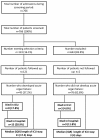Risk factors for acute organ failure in intensive care unit patients who receive respiratory support in the absence of non-respiratory organ failure: an international prospective cohort study
- PMID: 22512834
- PMCID: PMC3681390
- DOI: 10.1186/cc11306
Risk factors for acute organ failure in intensive care unit patients who receive respiratory support in the absence of non-respiratory organ failure: an international prospective cohort study
Abstract
Introduction: Many supposed low-risk intensive care unit (ICU) admissions develop acute organ failure (AOF). Identifying patients at high risk of developing AOF and targeting them with preventative strategies may be effective. Our study question was: in a population of ICU patients receiving positive pressure respiratory support (invasive or non-invasive) in the absence of non-respiratory AOF, what is the 14-day incidence of, risk factors for and time to acute organ failure?
Methods: In an international prospective cohort study, patients receiving positive pressure respiratory support (invasive or non-invasive) in the absence of non-respiratory AOF were enrolled and followed for 14 days. The primary outcome measure was the incidence of any AOF (defined as SOFA 3 to 4) during follow-up.
Results: A total of 123 of 766 screened patients (16.1%) were enrolled. Data are reported for 121 patients. In total, 45 out of 121 patients (37.2%) developed AOF. Mortality rates were higher in those with AOF: 17.8% versus 4.0% OR 5.11, P = 0.019) for ICU mortality; and 28.9% versus 11.8% (OR 2.80, P = 0.019) for hospital mortality. Median ICU length of stay was also longer in those with AOF (11 versus 3.0 days; P < 0.0001). Hypoxemic respiratory failure (P = 0.001) and cardiovascular dysfunction (that is, SOFA 1 to 2; P = 0.03) were associated with AOF. The median time to first AOF was two days.
Conclusions: Patients receiving positive (invasive or non-invasive) pressure respiratory support in the absence of non-respiratory AOF are commonly admitted to ICU; AOF is frequent in these patients. Organ failure developed within a short period after admission. Hypoxemic respiratory failure and cardiovascular dysfunction were strongly associated with AOF.
Figures



References
-
- Alberti C, Brun-Buisson C, Chevret S, Antonelli M, Goodman SV, Martin C, Moreno R, Ochagavia AR, Palazzo M, Werdan K, Le Gall JR. Systemic inflammatory response and progression to severe sepsis in critically ill infected patients. Am J Respir Crit Care Med. 2005;16:461–468. - PubMed
-
- Marshall JC. Sepsis research: where have we gone wrong? Crit Care Resusc. 2006;16:241–243. - PubMed
Publication types
MeSH terms
Grants and funding
LinkOut - more resources
Full Text Sources

